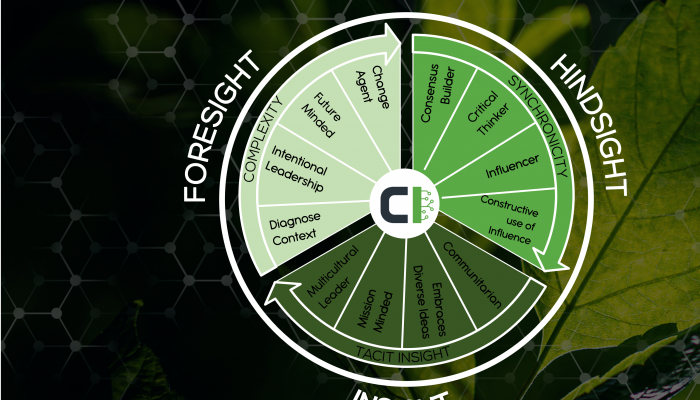Accelerating climate change, the rise of artificial intelligence, demographic shifts and yawning inequality, resource constraints – and the inter-related nature of the daunting challenges to humanity – all mean leaders are operating in a profoundly different context; one which requires a drastic change in thinking.
These challenges no longer present a ‘polycrisis’. Ours is a ‘permacrisis’, where the inter-related nature of events result in profound impact and exponential change. Linear thinking and traditional metrics of measurement and constructs simply no longer suffice.
Our traditional leadership models are not well equipped to address societal challenges and are proving to be outdated. Now leaders are required to be more conscious and agile, as the challenges we face can only be solved with a deep intercultural appreciation and in collaboration toward collective action.
Contextual intelligence helps make better decisions. Positioned at the intersection of strategy and leadership, where dated constructs and approaches have delivered poor results in recent years, contextual intelligence offers a framework to make leaders better strategists, encouraging them to think and respond more comprehensively to specific situations, weighing up the consequences of their actions and decisions, and to embrace multiple viewpoints simultaneously.
What is contextual intelligence?
Contextual intelligence brings together leadership, strategic thinking and economic behaviour, and is the ability to function, manage, or adapt to diverse settings.
A high degree of contextual intelligence among companies and individuals can result in leaders who are inclusive and impactful, and more successful, sustainable, profitable businesses.
The term is not new, with academic references to contextual intelligence dating from the mid-1980s, when Sternberg (1988, 1995) used the term “contextual intelligence” as a synonym for his concept of practical intelligence.
Writing in the Harvard Business Review, strategy and international business professor at Harvard Business School Tarun Khanna described contextual intelligence as “the ability to understand the limits of our knowledge and to adapt that knowledge to an environment different from the one in which it was developed”.
“Conditions differ enormously from place to place, in ways that aren’t easy to codify – conditions not just of economic development but of institutional character, physical geography, educational norms, language, and culture.”
Contextual intelligence is the ability to apply acquired knowledge to real-world scenarios.
In the area of strategy and leadership, it is the ability to recognise and diagnose the factors around an event or scenario, and intentionally adjust behaviour or a response that will influence the outcome.
“Understanding the limits of our knowledge, which is at the heart of contextual intelligence, is a very basic component of human comprehension. Yet it’s also a profoundly difficult, complicated process,” Khanna added.
It starts with acknowledging and understanding our bias, or our frame of reference and assumptions. In order to be contextually intelligent, leaders must pay attention to what is happening around them through enhanced awareness or simply a deeper sense of consciousness.
Contextual intelligence converges past events with current contextual variables and an awareness of a preferred future in a practical and culturally informed way.
A 3D thinking model
Author Matthew Kutz’s 3D thinking model illustrates how to use hindsight, insight, and foresight to navigate through complexity. Context is informed by the past, in the present, with an eye on the desired future. Hindsight, or where you come from, allows you to be mindful of biases and how they influence the decision-making processes.
“The contextual environment in which leaders must operate is increasingly complex,” Kutz explained. “Decisions must be instant, pragmatic, and offer real solutions for real problems.
There is a need for leaders who can both diagnose the context they are in, then exercise their knowledge to know what to do in the midst of changing and turbulent times.”
His model emphasises core mental models around embracing complexity, recognising the power of synchronicity or ‘joining the dots’, and tapping into one’s intuition, or what is often referred to as ‘trusting your gut’. We can certainly relate to this in highly unpredictable and fast-moving environments lacking in data and governing institutions that might help guide a quick diagnosis and decision.
The acquisition of new knowledge as a source of innovation can come from unexpected quarters. Kutz and Bamford-Wade wrote: “Synchronicity can be described as two [or more] simultaneous events that occur coincidentally; it is the idea that certain events, regardless of the context and time in which they occurred, are in some way related.”
Awareness of one’s surroundings and current context is crucial for identifying this information: “Recognising changes in perception, mood, and meaning requires an acute sense of what is happening around you and what is changing (and why) in the behaviours and attitudes of others. Both of these innovation sources require an acute sense of how others interact and behave.”
Why is it important now?
Current leadership models are stale and, some might argue, losing their relevance as they are increasingly inappropriate for the modern the world.
- Uncertainty, ambiguity and complexity have become the norm in a post-pandemic world.
- Organisations have changed, as has the purpose and role of business.
- Leaders and organisations must be future-orientated and become future-fit.
- We are all subjected to an overload of information and content, which influences our view on the world.
- We all have innate biases.
Africa is a microcosm, representing the most daunting global challenges of our time. Crises on the continent are playing out in real time. These require a special awareness of the continent’s unique context. Solutions must come from within in order to be viable and sustainable.
Africa is expected to suffer disproportionately from climate change. While the continent is responsible for only a fraction of greenhouse gas emissions, climate change is “harming food security, ecosystems, and economies, fuelling displacement and migration and worsening the threat of conflict over dwindling resources,” according to a new report from the World Meteorological Organisation (WMO).
Beyond systems thinking
Contextual intelligence is a multi-layered system approach to systems thinking, which is the act of organising information to make meaning. It takes systems thinking to the next level, recognising that a system is a product of the interaction of its parts, not just the sum of its parts.
This thinking acknowledges that the world is nonlinear and includes feedback and webs of causality. Yet, we think in simplistic, linear, and causal ways. A systems thinking perspective requires curiosity, clarity, compassion, choice, and courage (Goodman, 1997).
Systems thinking meets contextual intelligence by taking contextual factors into account when defining and solving problems in order to find innovative solutions.
How to develop contextual intelligence
How can leaders develop the high degree of agility needed to confront global challenges?
Kutz and Bamford-Wade explained: “Adaptive capacity is one of the most important predictors of performance across a diversity of industries. In turbulent environments, a fundamental element of performance depends on the individual’s ability to monitor behavioral cues.”
They identified 12 contextually intelligent behaviours and characteristics for leaders to cultivate to become future-fit, inclusive, and impactful leaders. These include, among others:
- Intentional leadership
- Critical thinking
- Consensus-building
- Future-mindedness
- Mission-mindedness
- Cultural sensitivity, and
- Multicultural leadership
In a geographical context, the acquisition of contextual intelligence can be enhanced by hiring people who are ‘fluent’ in more than one culture; partnering with local companies; developing local talent; doing more cross-disciplinary work; and taking the time to understand the nature and range of local variations, Khanna explained.
Contextually intelligent people embrace complexity, are adaptable and agile and reframe their experiences to embrace synchronicity and leverage learnings, realising that not everything is always based on data and strict frameworks. While these are an important source of information, increasingly leaders need to be aware of gut feel and intuition.
A global mindset for collective action
Kutz explained that contextual intelligence is “an intangible skill set needed, that if lacking, hinders some from truly excelling or reaching their full potential”. It is “a leadership model that can be learned and used through the acquisition and application of tacit-based knowledge, the concept of 3D thinking (awareness of the past, acute sense of the present, and understanding of the future), and the intentional integration of contextually intelligent behaviours. This framework is best applied in dynamic, uncertain, and ambiguous contexts.”
New leadership thinking needs to abandon linear thinking, reframe synchronicity, and tap into intuition by re-examining tacit knowledge and trusting our experiences. Contextual intelligence requires a global mindset for collective action in order to address the growing challenges of our time, while recognising that variables in our world are constantly shifting. Contextual intelligence is not only important for the sake of competitive businesses and leadership, but for the development of future leaders, for society and humanity as a whole.
Contextual intelligence can help us manage the most daunting challenges of our time
- Climate change and environmental risks. Climate change remains the greatest global challenge in the medium and long term. The past ten years have been the warmest on record, according to Nasa Climate Science. Extreme weather events, heat stress, flooding, and droughts will result in likely food insecurity and mass migration.
- Population and demographic challenges. The number of people aged 65 years or older worldwide is projected to more than double, rising from 761 million in 2021 to 1.6 billion in 2050, according to the UN. At the same time, Africa’s youthful population and ever-increasing urbanisation is placing strain on the continent’s sparse resources. Population growth could “lead to economic decline and social misery,” according to the African Development Bank.
- A low-growth and high-debt world. Public debt remains stubbornly high, according to the IMF, at a time when global GDP continues its anaemic growth trajectory. According to author Ruchir Sharma, in 2007 more than 60 countries were enjoying economic growth of over 7%. Just 15 years later, fewer than five countries have economic growth at that level. Meanwhile, global debt reached $315 trillion in 2023, nearly 350% of global GDP and roughly double the debt at the time of the global financial crisis in 2008.
- Social inequality is a business risk. Inequality between people is close to its highest point in 150 years, with the eight richest individuals holding the same wealth as the entire poorer half of the world, which amounts to approximately 3.6 billion people.
- The technology revolution and the rise of artificial intelligence. Technology and AI have the potential to revolutionise Africa, transforming governance, education, and entrepreneurial scaling, especially if the continent’s mobile capability can be harnessed. The only risk is getting left behind.
GIBS faculty member Prof. Lyal White is the academic director of the Centre for Leadership & Dialogue (CL&D) and part of the school’s global partnerships team. He is the founder of research and advisory practice Contextual Intelligence, part of the OneEarth Leadership Consortium and a research associate with the Brenthurst Foundation. Lyal is committed to purpose-driven business with a deep curiosity around the intersection of leadership, strategy, and economic performance.






